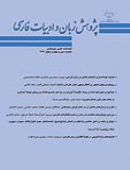نيماي معترض؛ تأويل هرمنوتيكي «كك¬كي»
محورهای موضوعی : پژوهشهای ادبیات کلاسیک ایران
1 -
کلید واژه: نيما يوشيج نمادگرايي هرمنوتيك كككي اعتراض,
چکیده مقاله :
«كک كي» از آن دسته شعرهاي نمادین نيماست كه تاريخ سروده شدنشان ذيل شعر ذكر نشده است؛ امّا نیماپژوهان آن را ميان دو شعر «برف» و «پاس ها از شب گذشته» قرار دادهاند كه به ترتيب داراي تاريخ هاي 1334 و زمستان 1336 هستند. ساختار، پيام و محتواي شعر نيز بر اين امر صحّه مي گذارد. نگارنده در مقالة حاضر، به روشی برگرفته از آراء شلاير ماخر با مطالعه آثار نيما و دربارة نيما و اوضاع و شرايط اجتماعي، سياسي، فرهنگي سال هاي پس از كودتا تا پايان عمر نيما، به تأويل «كك كي» پرداخته است. وي در مورد شعرهاي نماديني كه شاعر در آنها سعي در ابلاغ پيامي اجتماعي- سياسي دارد، تلاش براي دست يافتن به معناي مورد نظر مؤلّف را از وظايف تأويلگر مي داند؛ ضمن اين كه به سبب تراوش معني از نماد و اهميّت افق معنايي تأويلگر، بر امكان تأويل هاي مختلف از اين گونه شعرها، با انگيزههاي زبانشناختيِ محض، تأكيد مي ورزد.
“Kak-kei” is one of the symbolic poems of Nima whose date of composition is not mentioned by Nima; however, Nima-researchers has lodged it among two poems named “Barf” (Snow) and “Pass-ha az Shab Gozashte” (long hours has passed from the night) which are respectively dated from 1955 and winter 1957. Structure, message and content of the poem itself prove this too. The author in this article, applying a method using Schleiermacher ideas and studying Nima’s works and works about Nima and reviewing social, political and cultural conditions and situations after the coup d'etat until the death of Nima, attempts to interpret “Kak-kei”. The author considers attempting to reach the given meaning of poet as the tasks of Interpreter in symbolic poems in which the poet tries to give social-political message; whilst due to the semantic leakage from symbol and the significance of semantic horizon of the Interpreter, the author emphasizes on the different interpretations of such poems, having pure linguistic purposes in mind.


